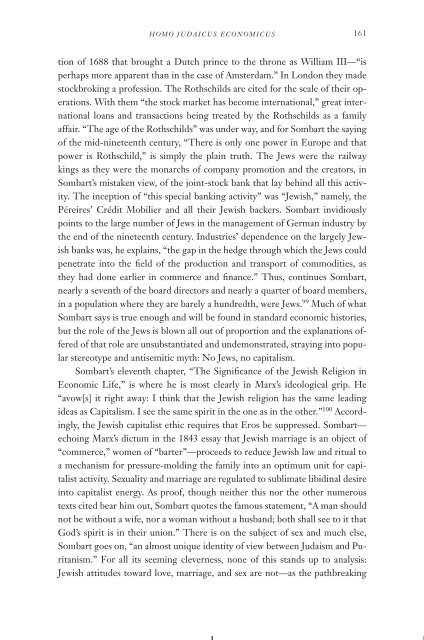Anti-semitism: Myth and Hate from Antiquity to the Present
Anti-semitism: Myth and Hate from Antiquity to the Present
Anti-semitism: Myth and Hate from Antiquity to the Present
You also want an ePaper? Increase the reach of your titles
YUMPU automatically turns print PDFs into web optimized ePapers that Google loves.
HOMO JUDAICUS ECONOMICUS<br />
161<br />
tion of 1688 that brought a Dutch prince <strong>to</strong> <strong>the</strong> throne as William III—“is<br />
perhaps more apparent than in <strong>the</strong> case of Amsterdam.” In London <strong>the</strong>y made<br />
s<strong>to</strong>ckbroking a profession. The Rothschilds are cited for <strong>the</strong> scale of <strong>the</strong>ir operations.<br />
With <strong>the</strong>m “<strong>the</strong> s<strong>to</strong>ck market has become international,” great international<br />
loans <strong>and</strong> transactions being treated by <strong>the</strong> Rothschilds as a family<br />
affair. “The age of <strong>the</strong> Rothschilds” was under way, <strong>and</strong> for Sombart <strong>the</strong> saying<br />
of <strong>the</strong> mid-nineteenth century, “There is only one power in Europe <strong>and</strong> that<br />
power is Rothschild,” is simply <strong>the</strong> plain truth. The Jews were <strong>the</strong> railway<br />
kings as <strong>the</strong>y were <strong>the</strong> monarchs of company promotion <strong>and</strong> <strong>the</strong> crea<strong>to</strong>rs, in<br />
Sombart’s mistaken view, of <strong>the</strong> joint-s<strong>to</strong>ck bank that lay behind all this activity.<br />
The inception of “this special banking activity” was “Jewish,” namely, <strong>the</strong><br />
Péreires’ Crédit Mobilier <strong>and</strong> all <strong>the</strong>ir Jewish backers. Sombart invidiously<br />
points <strong>to</strong> <strong>the</strong> large number of Jews in <strong>the</strong> management of German industry by<br />
<strong>the</strong> end of <strong>the</strong> nineteenth century. Industries’ dependence on <strong>the</strong> largely Jewish<br />
banks was, he explains, “<strong>the</strong> gap in <strong>the</strong> hedge through which <strong>the</strong> Jews could<br />
penetrate in<strong>to</strong> <strong>the</strong> field of <strong>the</strong> production <strong>and</strong> transport of commodities, as<br />
<strong>the</strong>y had done earlier in commerce <strong>and</strong> finance.” Thus, continues Sombart,<br />
nearly a seventh of <strong>the</strong> board direc<strong>to</strong>rs <strong>and</strong> nearly a quarter of board members,<br />
in a population where <strong>the</strong>y are barely a hundredth, were Jews. 99 Much of what<br />
Sombart says is true enough <strong>and</strong> will be found in st<strong>and</strong>ard economic his<strong>to</strong>ries,<br />
but <strong>the</strong> role of <strong>the</strong> Jews is blown all out of proportion <strong>and</strong> <strong>the</strong> explanations offered<br />
of that role are unsubstantiated <strong>and</strong> undemonstrated, straying in<strong>to</strong> popular<br />
stereotype <strong>and</strong> antisemitic myth: No Jews, no capitalism.<br />
Sombart’s eleventh chapter, “The Significance of <strong>the</strong> Jewish Religion in<br />
Economic Life,” is where he is most clearly in Marx’s ideological grip. He<br />
“avow[s] it right away: I think that <strong>the</strong> Jewish religion has <strong>the</strong> same leading<br />
ideas as Capitalism. I see <strong>the</strong> same spirit in <strong>the</strong> one as in <strong>the</strong> o<strong>the</strong>r.” 100 Accordingly,<br />
<strong>the</strong> Jewish capitalist ethic requires that Eros be suppressed. Sombart—<br />
echoing Marx’s dictum in <strong>the</strong> 1843 essay that Jewish marriage is an object of<br />
“commerce,” women of “barter”—proceeds <strong>to</strong> reduce Jewish law <strong>and</strong> ritual <strong>to</strong><br />
a mechanism for pressure-molding <strong>the</strong> family in<strong>to</strong> an optimum unit for capitalist<br />
activity. Sexuality <strong>and</strong> marriage are regulated <strong>to</strong> sublimate libidinal desire<br />
in<strong>to</strong> capitalist energy. As proof, though nei<strong>the</strong>r this nor <strong>the</strong> o<strong>the</strong>r numerous<br />
texts cited bear him out, Sombart quotes <strong>the</strong> famous statement, “A man should<br />
not be without a wife, nor a woman without a husb<strong>and</strong>; both shall see <strong>to</strong> it that<br />
God’s spirit is in <strong>the</strong>ir union.” There is on <strong>the</strong> subject of sex <strong>and</strong> much else,<br />
Sombart goes on, “an almost unique identity of view between Judaism <strong>and</strong> Puritanism.”<br />
For all its seeming cleverness, none of this st<strong>and</strong>s up <strong>to</strong> analysis:<br />
Jewish attitudes <strong>to</strong>ward love, marriage, <strong>and</strong> sex are not—as <strong>the</strong> pathbreaking
















